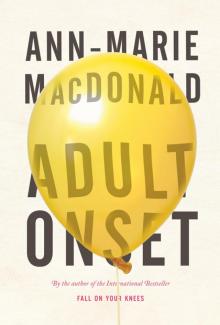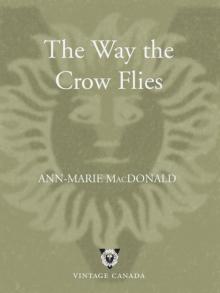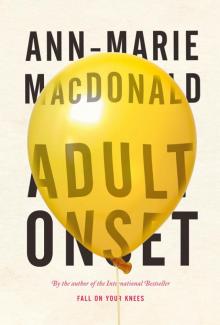- Home
- Ann-Marie MacDonald
The Way the Crow Flies Page 34
The Way the Crow Flies Read online
Page 34
At recess she knocks on Mr. Lemmon’s door. She tells him about the tree. He doesn’t say anything at first, and she thinks, oh no, I’m going to get the strap.
Then he says, “Come here, Madeleine.” He is sitting behind his desk, and she thinks, I’m not going to get the strap after all, he is going to make me do exercises. She feels tired because this means she will have to start feeling sorry for Mr. Lemmon too. She approaches his desk and sighs—she ought to have known that this is what happens. She stands close enough for him to reach out and squeeze her arm muscle, and he does reach out, but he takes her hand instead. He shakes it. “I’m impressed, Madeleine, very impressed.”
That I hacked up a tree?
“Most children would not have the courage to confess as you’ve just done.”
Courage. A hail of bullets. Saving a dog from rapids. Being a juvenile delinquent. Confessing to it.
“Run along now, Madeleine.”
Mr. March doesn’t call the exercise group for a week after Halloween. And then, in the second week of November: “The following little girls will remain after the bell: Diane Vogel, Joyce Nutt, Grace Novotny …”
Madeleine waits for her name, the hot feeling in her underpants, the sick feeling in her stomach.
“… Marjorie Nolan … and Claire McCarroll.”
What?
The bell goes. The clatter of chairs as everyone but the exercise group gets up to flee for another day. Madeleine remains at her desk and glances over at Claire, who has turned pink. When the room is clear, the members of the exercise group rise from their desks and line up shoulder to shoulder along the back wall, against the coat hooks. Claire follows them and fills the empty place next to Marjorie. From her desk, Madeleine can see that Claire’s knees have turned pink too. What does Claire think is going to happen? She is in the cave now. From outside it looks like an ordinary mountain.
“What are you waiting for, Madeleine?” asks Mr. March.
She rises from her desk, walks to the coat hooks and stands at the end of the line beside Claire.
Mr. March rolls his eyes. “For heaven’s sake, little girl, did you hear your name?”
“No sir,” says Madeleine.
“Well then?” Someone giggles. Madeleine walks back to her desk and reaches in for her homework—“Slow as molasses in January,” says Mr. March.
She leaves. Marjorie giggles again. Diane Vogel looks straight at her, with a solemnity that Madeleine has seen in a photograph in a book. It reminds her of Anne Frank, and that explains why she loves Diane Vogel. Claire is looking out the window.
Madeleine does not go straight home. Kids pour out of the school, yet the air around her feels quiet, muffled mohair. The kids stampeding past seem far away, as though they are in a movie. She traverses the throng and reaches the swings. She feels flushed, as though she has done something bad, and she knows that when she gets home Maman will take one look at her and say, “Do you have a guilty conscience?” Her head is hot and hazy, as though she has been up to something shameful—like watching a boy after he has offered to pee in front of you and all you have said in reply is, “If you want to.” She has watched Philip Pinder pee. That was a sin. But she has not sinned today.
She sits on the swing. Stupid Claire McCarroll, if she hadn’t been picked Madeleine would not feel so guilty now. Like Adam and Eve when God banished them from the Garden of Eden. And they knew they were naked. How dumb did they have to be not to notice in the first place?
She pushes off on the swing as the schoolyard shrieks and empties around her, kicking the scuffed dirt with her Buster Browns, picturing Mr. March, his floppy grey cheeks; how she does her backbends for him and he feels her “sweat glands” between her legs. She closes her eyes and sees Jesus’ face, so sad. Jesus is sad because you have hurt him. Jesus often looks as though someone had just farted. She folds her arms across her knees and rests her forehead there, staring down between her dangling feet at a tiny patch of world.
Only yesterday, she was at home on the couch with her brother and Bugs Bunny, watching The Beverly Hillbillies, and it seemed then that there was no such thing as exercises. All that stuff remained in its own place. As if those eleven minutes after the bell were sealed and stored separately—the way you wrap leftovers in plastic so they won’t go bad. The bag may have leaked a bit before but now it has broken and the smell is everywhere. Because today she was expelled from after-three, and now she is watching this patch of world move back and forth, back and forth….
The toes of her shoes are badly scuffed now. She sits up and stretches her legs out in front. She thinks, everyone thinks I’m just a little girl with white ankle socks. They don’t know that I know about after-three. About the coat hooks, how you can press your spine against one while you wait to see if he will call you up to the front. You try to press so hard against the hook that you will keep feeling it all the way through your exercises. They don’t know that I know about Mr. March. About his smell. Like Javex. But I will go like the wind until all his smell is off me. She starts pumping her legs to get the swing going.
“We ha-ad chocolates, and you-ou di-dn’t”—chanting—“nyah nyah-nyah, nyah nyah!”
Marjorie and Grace are holding hands, swinging them back and forth. Marjorie has chocolate around her mouth, as if to prove to Madeleine that she really did have it after the bell.
“So?! What’s so big about that?!” Madeleine grips the chains of the swing.
“You di-dn’t get a-any!” Marjorie sticks out her tongue, smeary brown.
Madeleine decides to ignore them and keep swinging.
“Where’s your friend, Madeleine?”
Madeleine pumps and swings higher, the air feels good against her hot legs, her hot face.
“Yeah!” says Grace, which is quite a lot for Grace.
“Who?” demands Madeleine from a furious height.
“You know,” Marjorie replies, then starts batting her hand against her mouth, whooping like an Indian in a cowboy movie. Madeleine lets go of the swing and sails softly through air, lands like a bullet, then pound, pound, pound!
“That’s for you, Marjorie Nolan!”
Marjorie is screaming, blood has poured from her nose to join the chocolate mess around her mouth.
“I’m sorry!” Madeleine hollers into Marjorie’s face, almost in time with the last blow.
And she is sorry. Boys do this all the time. Beat each other up. Madeleine is amazed because when you hurt people they are so pathetic, how could you want to keep on hurting them, or ever do it again to anyone? She pats Marjorie’s head. “Here, Marjorie.” She takes off one of her shoes, peels off her ankle sock and dabs Marjorie’s nose with it—poor Marjorie, who is so revolting and can’t keep anything in, her blood, her snot, tears and tongue. She is still sobbing urgently. Madeleine is suddenly terribly sad.
Marjorie gets up. “I’m telling!” She turns and flails toward home, head thrown back, hands flapping, wailing past the point of really crying, Madeleine can tell, but that’s even sadder, because how horrible to be Marjorie.
Madeleine looks around for Grace Novotny, but Grace has run away. Grace peed her pants in school last year, and that’s all you need to know about Grace.
“I’m sorry,” repeats Madeleine softly to herself.
She still doesn’t feel like going home. She can’t put her ankle sock back on, it has Marjorie gunk on it. She removes her other sock, then puts her shoes back on. She plucks at the dark November grass until she has muddy roots in two fists, and rubs them onto her bare ankles. She rubs the earth in rings around her wrists and stripes her cheeks with it. She sees Claire McCarroll walking slowly from the side door, head down, knees still pink. She is carrying her art.
“Hi Claire.”
Claire stops but doesn’t look up.
“What’s your art?”
“A turkey,” Claire replies.
“Can I see?”
Claire stays looking down but holds the turkey out to M
adeleine. It is smiling, wearing a pilgrim’s hat and a white neck ruff.
“That’s really nice.”
“Thank you.”
“How come you made a turkey though?”
“We’re American.”
Madeleine had forgotten. Americans celebrate Thanksgiving in November. Claire’s other hand is clenched in a fist.
“Watcha got?” asks Madeleine.
Claire opens her hand. Her palm is a dark smear, in the centre a melting nub. Madeleine reaches out, dips a finger in Claire’s palm and tastes the chocolate.
Mrs. McCarroll shows the note to Mr. McCarroll. “It was on the porch with the milk.”
“Claire.” Her father beckons gently.
Claire is seated on the McCarrolls’ living-room couch. Her mother stands with her hands folded, her father sits next to her, stroking her head.
“Claire, honey, are you in any trouble at school?”
Claire turns very red.
“It’s all right, lamb, you can tell Daddy and me.”
Claire looks down and adjusts her hairband with one finger. Blair and Sharon look at one another.
“Hey, pet?” asks Blair.
“Is Mr. March not happy with your work, darlin’?” asks Sharon.
But Claire will not look up and she will not say anything. She sits on her hands and big tears fall into her lap.
Madeleine waits for the Children’s Aid to arrive in a kind of ambulance and take her away “for violence,” but nothing happens. Marjorie Nolan has not told on her. And up at the front of the class, on the big felt bulletin board, she sees that she has become a hare in all subjects. She is even a hare in arithmetic. Now I’ve hoid everything, doc.
She helps her father rake the leaves, and confesses to having attacked the tree. He asks if she owned up to it at school and she answers yes. He tells her that she was taking out her anger at her teacher for scaring them with duck and cover, and possibly her anger at the entire grown-up world for having brought us so close to the brink of war: “Sometimes when we’re frightened—when we feel powerless—we do irrational things. Do you know what ‘irrational’ means?” She does not. He tells her.
It was wrong to damage the tree, it was “not constructive” and it was not rational. But it was courageous of her to tell the truth—“You did the right thing, sweetie.” He is proud of her.
She says, “I hurt the tree,” and weeps inconsolably.
She wakes herself up screaming. She was punching the tree and her hand was full of chocolate blood.
She finishes out the night in Mike’s room.
“But what if there isn’t a war on?” she asks him, savouring the canvas smell of the hard camp cot. “How can you fight in one?” They are discussing the future.
“There’s always a bit of war on somewhere,” Mike replies in the dark. “And there’s assassin jobs that are so secret, you never even hear about them.”
“And that’s when you’re a missionary?”
“Mercenary.”
It sounds like someone going around being merciful to people, but it’s just the opposite, thinks Madeleine. How can you go around killing people you’re not even mad at, who aren’t even your enemy?
“It’s nothing personal,” says Mike, “you’re a professional soldier, you work for pay. Anyhow, mercenary’s just my third choice—like if something happens to me, say I lose an eye like Daddy.”
Madeleine can just make out the framed photo of an elegant airborne CF-104 on the wall over Mike’s bed. The pilot is looking at the camera from the window of the cockpit, but his face is not visible because he is wearing an oxygen mask—corrugated snout and goggles.
“What’s your first choice?” Madeleine knows the answer but she doesn’t want him to fall asleep.
“No question about it,” he says. “Fighter pilot. That’s what I’m going to be doing six or seven years from now.”
“What’s your second choice?”
“NHL.”
“What position?”
“Forward.”
“I’m defence.”
“You’re not on the ice, you’re a girl.”
“Let’s say I’m a boy.”
“Yeah, but you aren’t.”
“Yeah, but let’s say.”
“Well….”
“Yeah, and my name is Mike, I mean Mitch, okay? And I’m really a boy.”
“You’re stunned.”
“Pretend I’m really your brother, okay?”
“Mitch?”
“Yes Mike?”
“No, I mean are you sure you want your name to be Mitch?”
“What should it be?”
“… Robert.”
“Okay.”
He doesn’t say anything for a while and Madeleine figures he has fallen asleep. Then he whispers, “Hey Rob?”
“Yeah?” Her voice feels slightly different. Not deeper, really. Lighter. Like a basketball off the driveway. Like red jeans. Madeleine waits for him to continue. After a moment he does. “What do you think of Marsha Woodley?”
Madeleine is so embarrassed she wants to squeal and pull the covers over her head, but she remembers she is Rob. “Gee, Mike. I don’t know. Why?”
“Do you think she’s…. You know. Special?”
“Yeah.” Madeleine nods in the dark. “She’s a real lady.”
“Yeah, that’s what I think.”
She hesitates, then says, “And Rick is a real gentleman.”
“Yup.”
In the silence that follows, she waits for him to continue, but hears his breathing change and knows that he really is asleep this time. She falls asleep and has no nightmares. Rob never has nightmares.
Captain and Mrs. McCarroll are relieved when Mr. Lemmon calls their daughter’s teacher into his office, and Mr. March is able to assure the worried parents, “Claire is a bright and pleasant student but she is a little given to daydreaming.”
Captain McCarroll blushes and Mrs. McCarroll smiles, saying, “She gets that from her daddy.”
Mr. Lemmon shows Mr. March the note. “Do you have any idea who might have written this?”
Mr. March takes a moment to consider, then shakes his head. “I can ask my pupils,” he volunteers.
“Oh please don’t bother.” Sharon blushes.
Captain McCarroll says, “We don’t want to embarrass her.”
Mr. Lemmon asks if Mr. March has had occasion to keep Claire after three, and he replies that he did keep her and one or two other children for a few minutes to go over some spelling exercises, “but certainly not as a punishment for bad behaviour.”
Mr. Lemmon thanks the parents for coming in, and Mr. March for clearing the matter up.
Claire is never again required to remain after three.
It is Marjorie Nolan who first feels his hands around her neck. Then Grace Novotny brings home bruises that no one asks her to explain. And that is all you need to know about Grace’s mum and dad.
Part Two
FLYING UP
INDIAN SUMMER
Which sentence is correct? (a) Smoking Days are the same as Indian Summer. (b) Indian Fall is the same as Smoking Days. (c) Indian Summer is Smoking Week. (d) Smoking Days bring Indian Autumn.
Developing Comprehension in Reading,
Mary Eleanor Thomas, 1956
THE WREATHS HAVE WILTED at the base of the cenotaph in Exeter, felt poppies have fallen from lapel pins and washed up against curbs softened by autumn leaves, damp and exhaling the last earthy smell before winter puts all scent and soil to sleep. Overhead, the remaining leaves have lost their lustre, clinging sparse and ragged to trees revealed magnificently complex against a hard orange sky at five in the afternoon. November. Two minutes of silence at the eleventh hour of the eleventh day of the eleventh month, to mark the end of the war to end all wars in 1918—and all the others since then. It seems also to have marked the setting in of the deep hibernation that muffles the land like a blanket. Shhh, winter is coming. In the air is the
unmistakeable smell of snow.
Madeleine can smell it and she supposes Colleen can too. In the park it’s cold and growing dark. Cold enough for mittens, but until the first snow comes who thinks of wearing them? Colleen’s feet are still bare inside her tattered runners. Madeleine has turned nine. A wily number, able to look after itself. She had a pajama party and felt guilty for not inviting Colleen, but she couldn’t picture her with her other friends, in baby dolls and curlers, levitating and talking about boys. And Madeleine would not have known which self to be. There is also a sense that the time she and Colleen spend together is something separate. Private.
They are crouched now at the far end of the park behind Colleen’s house. It borders a number of backyards, including Philip Pinder’s, where, this evening, there is a deer hanging upside down from a tree. Cold blood drips out of its mouth into a metal pail. Its eyes are staring open and a drop of liquid hangs from its nose. It’s draining. As it turns slowly from its rope and pulley you can see where it has been slit open as though it had just unzipped its deer suit, like in a cartoon. All of its insides are piled green and brown and pink in a plastic bucket. It’s an evil thing. Not the deer. But what has been done.
From the teeter-totters in the park, it seemed as though the deer might not be real. Or at least you could say, “That’s a deer that Philip’s father shot,” and feel almost normal about it, because hunting is normal. But when Madeleine came closer and saw the deer slowly rotating by its hind ankles, legs stretched so that it seemed they must snap and recoil any second, it was different. It did not feel normal. But Philip, his older brother, Arnold, their father, their mother and their Uncle Wilf are all out in the yard, working on the deer and behaving normally; although with an added air of seriousness, the way a person might if they were, for example, practising backing their new Airstream trailer into the driveway: “It’s not that I’m trying to show off. This is work.”
A neighbour comments, “That’s quite a deer, Harve.” But Madeleine can see that the neighbour is a bit embarrassed, trying to be polite, saying something about a dead deer that you would normally say about a garden. “That’s quite a rhododendron, Harve.”

 Adult Onset
Adult Onset Belle Moral: A Natural History
Belle Moral: A Natural History The Way the Crow Flies
The Way the Crow Flies SSC (2012) Adult Onset
SSC (2012) Adult Onset